HOW TO JOIN:
When creating your account, you’ll see three options. Here’s what they mean:
(Individual)
• Best for most people.
• You earn hours when you help someone and spend hours when someone helps you.
• Example: You mow a neighbor’s lawn for 1 hour → you earn 1 hour. You use that hour later for help with tutoring, rides, or errands.
(Business)
• For small businesses that want to participate.
• Businesses earn hours by offering services (like a haircut, car repair, or catering help).
✅ Rule: Only the active time spent teaching, helping, or guiding counts. Items, products, or the final output (haircut, repaired car, cooked food, drink, painting) DO NOT count as hours.
• This keeps local businesses connected to the community.
(Organization)
• For community groups, nonprofits, or faith-based organizations.
• Organizations can earn hours by offering things like food pantry support, workshops, or event space.
• Example: Nonprofit organization: Provides 1-hour career coaching for youth → 1 hour logged for the volunteer/staff helping.
• Animal shelter: Volunteer guides a 1-hour dog-walking session → 1 hour logged.
• They can spend hours when they need volunteers, deliveries, or setup help.
• Members can also donate hours to organizations to strengthen community projects.
✅ Most people should choose (Individual) when signing up.
Businesses and organizations are always welcomed too, but they MUST also give back in order to earn hours.
Services/Skills Counted: Any hands-on assistance, teaching, or direct help provided to others.
Goods Not Counted: Products, materials, or items (like saying a haircut is worth 10 hours when it only takes 30 mins, car parts, or beverages/food, etc) are not counted.
WHO THIS IS FOR
Individuals, families, groups, and businesses who want to connect, share skills, and support one another in everyday life.
No special experience needed — Just a willingness to participate and show up with care.
WHAT HAPPENS NEXT
Once you join, you’ll be able to:
- Post requests
- Offer help or skills
- Connect privately with members
Full guidelines are available after you log in!
✨Thank you for joining a community where everyone’s time truly matters.✨
